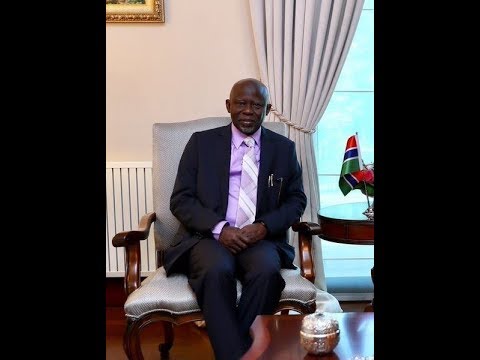We, the members of the National Food Security Council of The Republic of The Gambia, met in the office of the Vice President, at the emergency meeting of the National Food Security Council with development partners, to discuss the 2018/2019 rainfall situation and the effects on crops, livestock and the food security situation of the farming community and to explore appropriate policy responses.
IN VIEW OF THE FACT that:
- Rains for this year (2018) started during the first dekad of June followed by dry spells and scanty rain falls in August.
- This situation has eventually halted continuous sowing of major crops while also threatening the successful germination of seeds already sown.
- An agricultural District Extension Circle (DEC) had only 4 rainfalls from the last week of June to end of July cumulative of which was only 30.8mm whereas in the whole of August there were 7 rainfalls registering a cumulative figure of 197.4mm i.e an average of 28mm per rainy day.
- The Department of Water Resources seasonal rainfall prediction for July, August and September 2018 indicated 45% chance of below normal rainfall, 40% chance of near normal rainfall and 15% chance for above normal rainfall.
- Groundnut-out of the 61% of seeds sown, just about half (55%) germinated as a result of the dry spell. The area cultivated under groundnut drastically reduced due to lack of seeds because of last year’s poor harvest,
- Rice-the staple food crop is below half both for area cultivated and germination nationally,
- Early Millet– crop is the least crops affected generally because it was dry planted and germination was therefore good. However, more than 50% of this crop is stunted countrywide.
- Maize– the area cultivated has declined by 39% and most of the areas cultivated this year were within the backyard, particularly areas that were tethered.
- Cowpea-had an increase in area cultivated because of its climate smart traits in addition to increased demand for Home-Grown School Feeding Program (HGSFP).
- Livestock-Prolonged hunger due to long dry spell has exposed the livestock to loss of productivity and mortality
DECLARES that:
- About 1,711,318 people will be under pressure throughout the year if the present rainfall situation continues up to the end of the cropping season.
- Direct access to food and nutrition packages from Government of The Gambia and Development Partners to the tune of 200, 224mt of rice and 99,256mt of coarse grains in 2019 will be needed to help mitigate against the eminent food insecurity pressure.
- Rice production is expected to drop by 45%, leaving production level at about 15,098 metric tons, which can cover about 8% of the rice needs of the regions leaving a gap of 92% (185,126mt). This shortfall is valued at 5.2 billion Dalasi or US$110.3 million.
- Groundnut is equally expected to drop by 25,519 Mt with a cash value of D689, 103,000 or US$14.660 million.
- Prolonged hunger due to long dry spell has exposed the livestock to loss of productivity and mortality, leading to a loss value of 1,554,739,952 Dalasi
RECOMMENDATIONS
- A preharvest and postharvest assessments be conducted in September and November 2018 respectively to validate the Assessment Report against the final production;
- Safeguard 200, 224mt of rice and 99,256mt of coarse grains as emergency relief assistance to 1,711,318 inhabitants in the 6 typical agricultural regions;
- Provide improved vegetable seeds for the Community Vegetable Schemes to enable farmers particularly women to enhance vegetable production and productivity;
- Aid farmers with 500 metric tons of feed concentrates, 20,000 5kg of multi-nutrient Blocks; and 1,100,000 doses of anthelmintic for both small and large ruminants.
- Aid farmers with 9990 metric tons of groundnut seeds, 3445 metric tons of rice seeds, 425,444 metric tons of NPK and 137,800 metric tons of Urea for groundnut and rice respectively
- Intensification of livestock production and breeding of drought tolerant breeds, establishment of 3000 small ruminant breeding and production schemes to replace the loss stock.
- Mass vaccination campaign against endemic diseases PPR (500,000doses), CBPP (300,000 doses) BQ (50,000 doses), HS (50,000 doses) and FMD (10,000 doses).
- Provision of livestock watering points (20 boreholes, hill side reservoirs and access ramps)
On behalf of the Government and the people of The Gambia, I make a passionate plea for assistance from all development partners and friends of The Gambia to help mitigate the effects of food insecurity that will affect over 1.7 million Gambians.
A.N.M. Ousainu Darboe
Vice President and Minister of Women’s Affairs









